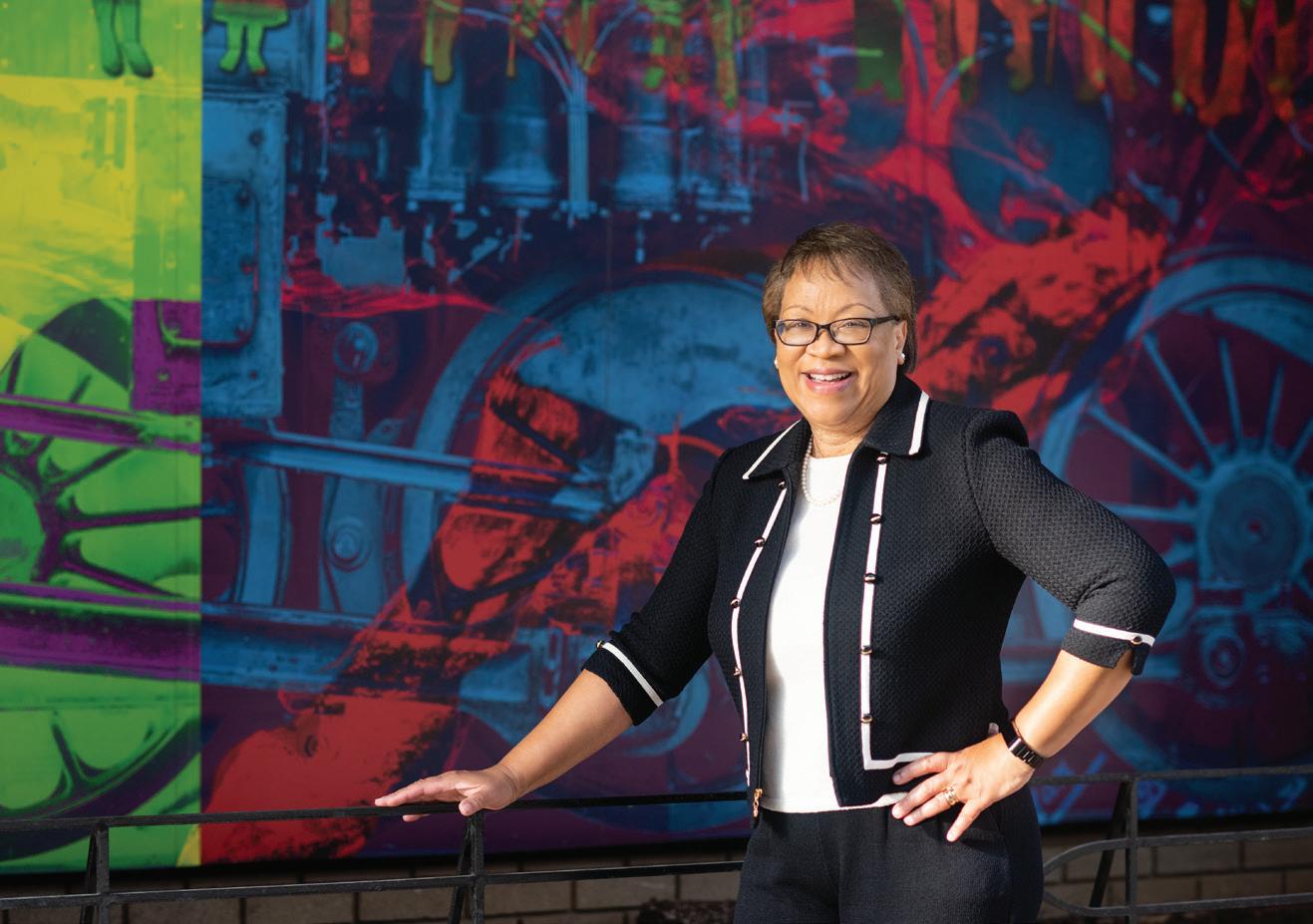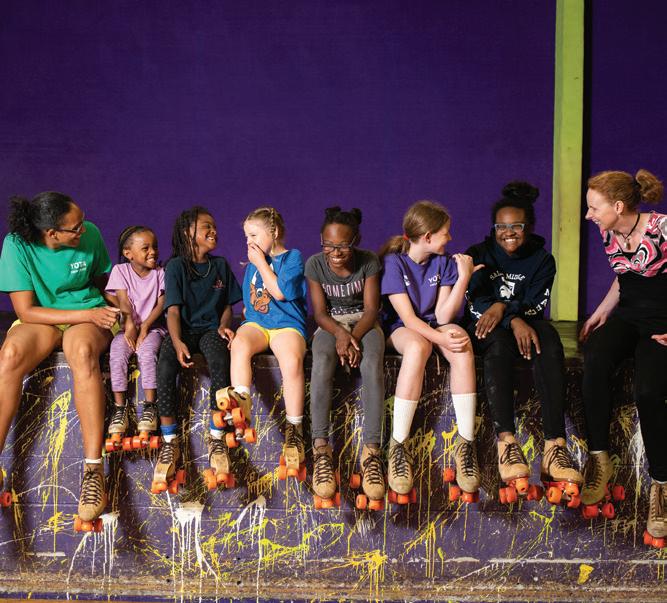
7 minute read
Healthy Durham
far back as the 1990s, the city was going beyond required public hearings to hear from residents about budgetary priorities. Face-to-face meetings in the community with residents known as “Coffee with Council” were an annual opportunity for city staff and elected officials to meet to share information and listen to residents. Over the years, these and other strategies have helped better align available resources with community needs and wants. I have [also] learned that communication can always be improved. Transparency and accountability are achieved through effective communication, and the need to communicate is always growing and changing.
At the end of this interim period, what do you hope to have
accomplished? In the coming days and weeks, the mayor and Durham City Council will decide on their next steps and process for selecting the next city manager. Because this assignment is temporary, regardless of the duration, I hope to have provided the operational stability an organization in transition needs. I hope to have carried out the policies established by elected officials efficiently, effectively and equitably. As a well-managed city, Durham is consistently developing long-range plans covering many areas, including general capital facility improvements, transportation systems and assets, infrastructure expansion, land use and community development. Plans being developed and updated now will certainly be shaped by equitable engagement priorities and lessons learned from the COVID-19 pandemic. These and other considerations will lead to a community designed for the future.
What do you hope Durham will look like in 5 years? In 10 years?
Futuristic statements are always interesting to think about and are usually developed through a community visioning process. Durham’s current vision statement was developed this way. I believe [the] statement, “Durham is the leading city in providing an excellent and sustainable quality of life,” will still be relevant at these future markers. Implementing strategies today to close the quality-of-life gaps that currently exist among residents will permit us to arrive in 2025 and beyond in a city where economic prosperity is shared by all [and] our residents live in safer communities that are connected, engaged and diverse.
STAYING CONNECTED ACROSS THE DIGITAL DIVIDE By Mia Cooper
IN PARTNERSHIP WITH CITY OF DURHAM | COUNTY OF DURHAM | DUKE UNIVERSITY | DUKE UNIVERSITY HEALTH SYSTEM | DURHAM CAN | DURHAM PUBLIC SCHOOLS DURHAM CONGREGATIONS IN ACTION | GREATER DURHAM CHAMBER OF COMMERCE | INTERDENOMINATIONAL MINISTERIAL ALLIANCE LINCOLN COMMUNITY HEALTH CENTER | PROJECT ACCESS OF DURHAM COUNTY | PARTNERSHIP FOR A HEALTHY DURHAM TRIANGLE COMMUNITY FOUNDATION | THE INSTITUTE

The value of everyday social interactions that existed and political climate.” In response, FCD found innovative pre-pandemic are missed today. Yet nonprofits ways to continue providing resources that families may need like Family Connects Durham, Sisters Network through contactless drop-offs. These resource packages Triangle NC and Diaper Bank of North Carolina are include a range of items, with help from other organizations finding creative ways to continue helping and connecting like Inter-Faith Food Shuttle and Book Harvest. “We’ll with the community across the digital divide. provide things like diapers, baby wipes and other essentials FAMILY CONNECTS DURHAM and masks,” Caitlin says. This organization continues to support families by FCD works diligently to stay connected with the families transforming its in-home nurse visitation model into virtual they serve in the community, but teleconferencing fatigue experiences. Check-ins with is real, and nothing seems to parents and their newborns are compare to the quality time that now conducted through video was spent face-to-face with each chat or by phone. “We used to family. Home visitors are now on go in-person and visit families calls and staring at screens six to in the hospital … but now we’ve eight hours a day. “We’ve even had to switch to virtual visits,” started holding virtual weekly says FCD Community Alignment self-care groups just to check in Specialist Caitlin Georgas. FCD on one another and parents,” has also gone virtual with its Karen says. “It’s definitely a early childhood developmental different experience … we miss activities. “Pre-coronavirus, our Eugenya Rodriguez and Anna Pabón practice how to keep kids our families very much.” home visitors were able to bring engaged during virtual Durham Early Head Start home visits. toys, games and other activities along with additional items like hand sanitizer, thermometers to each household to help families reach their personal SISTERS NETWORK TRIANGLE NC developmental milestones and goals,” says FCD Coordinator Dedicated to improving breast cancer outcomes in African Karen Carmody. “Now our virtual home visits consist of American women, Sisters Network Triangle NC refuses to helping families find things they can use in their homes to let the pandemic steal its shine. Faced with the challenge of recreate these activities.” connecting new members with other survivors to maintain
The pandemic leads to many other obstacles for families, support, SNTNC began using a video conferencing platform. including financial instability and the increased need for Monthly group meetings that used to be separate to emotional support. “We see families, particularly parents, accommodate both the Raleigh and Durham locations are who may be experiencing depression or anxiety,” Karen says. now conveniently combined through Zoom conversations. “Imagine being a first-time parent living through the COVID-19 “Throughout the first month of transitioning to events pandemic while also being overwhelmed by the current social virtually, it was a great result,” says Valarie Worthy, SNTNC’s
founder and former president. “I was surprised at the number of people who actually joined our groups.” Guest speakers also signed on. “During one virtual event, we had a medical family therapist from a local cancer center talk about anxiety and not being able to have that one-onone touch with everyone,” Valarie says. At one of SNTNC’s local meeting spaces, the group also held a drive-thru event where members played music and handed out gift packages to participants. “You have to find creative ways to support people so that they continue to feel valued,” says Valarie, a 21-year breast cancer survivor.
SNTNC also promoted October as Breast Cancer Awareness Month through the use of its website and digital announcements shared with family and friends. A page is in the works for the site, which will allow survivors to share their testimonies in order to encourage others who are battling breast cancer. “[The pandemic] makes you truly appreciate that unsolicited emotional support we would regularly have from family and friends,” Valarie says.
DIAPER BANK OF NORTH CAROLINA Diaper Bank of NC remains committed to meeting the increased need for diapers and other personal hygiene products for local families. Founded in 2013 at Executive Director Michelle Old’s kitchen table in Durham, DBNC now distributes about 4 million diapers a year for families in need. “Before COVID, we typically worked with 800 volunteers and put out 400,000 diapers a month,” Michelle says. “But when COVID hit, we had to halt volunteering while continuing to meet the demand.”
DBNC saw a 400% increase in diaper needs and an 800% increase in period product requests since the start of the pandemic. In response, DBNC partnered with organizations like FCD, Durham Community Food Pantry and Welcome Baby to form contactless drive-thrus and outdoor wrapping events. “We’ll have each car drive up, the family will say the size diaper they need, we place packaged diapers on the table, and the family is able to collect them and drive off,” Michelle explains. DBNC also uses mobile distribution drop-offs in which trucks take and distribute diapers and hygiene products throughout communities. Michelle also mentions the trickle-down effect the pandemic has caused for vulnerable families and those who’ve lost their jobs. “Diapers cost, on average, $100 a month,” she says. “We’re helping families save money on buying diapers, so they are now able to buy food, pay a bill, purchase their medicine ... something as simple as a diaper has a huge impact.”
HEALTHY HEALTHYDURHAM2020.ORG/PARTNERS /HEALTHYDURHAM2020 F I N D A L I S T O F H E A LT H Y D U R H A M P A R T N E R S AT A NEW VISION … DURHAM 20 / Healthy Durham 20/20 serves as a catalyst and amplifier for a thriving and coordinated culture of health throughout Durham County bringing together a broad coalition of government, education, faith, healthcare, community, philanthropy and business organizations. GET CONNECTED HEALTHYDURHAM2020.ORG /HEALTHYDURHAM2020 20







